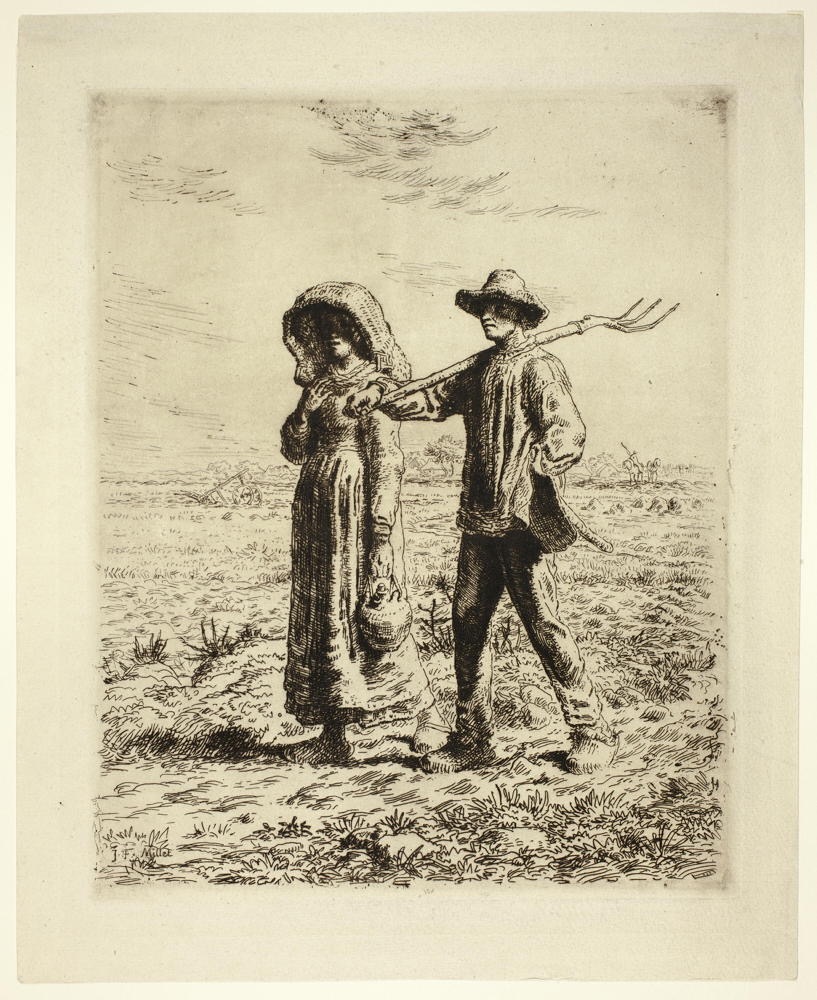WhatIDo

Jean François Millet: Peasants Going to Work (1863)
"If you glimpse yourself in there, you're finally seeing the other."
I write loosely autobiographical sketches, whatever that might mean. What that might mean remains an issue of considerable interest to me since I turn out to be the author of my experience, of these experiences. I harbor deep doubts that I know how to actually do what I claim to be up to. So deep run those doubts that they entice me up and out of my bed every morning to see if I might manage to prove my case to myself. Some mornings, I feel as though I've come close to approaching that purpose, but even then, I still feel aspiring.
My specific autobiographical details should properly be of little interest to any of my readers. I have not lived a necessarily noteworthy existence so far. I have lived an unremarkable life with a few minor exceptions. This fact might render my sketches most valuable, for I seem to encounter few examples of the ordinary in writing. We seem to prefer to write and read works about extraordinary characters such that should anyone ask the perfectly reasonable question about how utterly ordinary people lived in a time, the colloquial or historical record seems awfully quiet.
This probably stems from the fact that until relatively recently, only the extraordinary had access to any of the tools and skills necessary to create any sort of long-lived history. The masses couldn't write or read, so they chronicled their living verbally with stories that inexorably changed with their context such that two or three generations following, meanings might well seem completely different than originally intended. We struggle to know how ordinary people came to know, their manners of living essentially opaque to any modern asking. We could not know, for instance, if their intentions and purposes varied greatly from those we ordinarily hold today. We suspect they were different, more primitive, though they more likely weren’t.
I began writing in earnest when I encountered a fundamentally unanswerable question. I wondered about my grandfather's manner of living. I asked myself this question half a century after he stopped living. He left no written record of whatever he had ever been thinking. I could not recover and consider how he went about his life. How he came to become the man I ultimately knew, how he came to know and understand or do anything. I only had access to dates and events. I can answer the question about when he bought his home but not what else he considered. I know precisely how much he paid every month for his mortgage but not how he struggled to earn the money to pay for it through The Great Depression. I know almost none of his stories.
I dedicated myself then to try to leave a few more footprints than he had. I have a much better than his third-grade education, so I possess the skills that might make this mission at least plausible, though the concept hardly resolves any of the more practical aspects of such a project. Where should I begin if I were to chronicle my manner of living? Where should I target ending? It quickly became apparent that neither question had anything remotely resembling obvious answers. They seemed more irrelevant than cogent. Where to begin might not matter any more than where such a work might target ending. It might be that chronicling a manner of living never needs to become a sequential exposition. It might by necessity demand that it not contain a coherent plotline, just like any life, precisely like every existence. Only after the fact can plots tidy up aspects of anyone's manner of living. What we accomplish says almost nothing about our manner of living. What we believe and how we choose might prove more interesting, more definitive, if not necessarily longer-living. We seldom even ask questions that might prompt manner-of-living answers.
Almost everything I've found describing how to write ignores my central question: How might I chronicle my manner of living? In my sixth year considering this question, I feel only somewhat closer to an answer. Now that I have this much experience trying, I suspect this question might have always been fundamentally undecidable. It might need to somehow decide itself in each moment this writer attempts to satisfy his intention. It might never matter where he begins or where he ends any story or any book. One simply begins and sticks with it until it seems to approach some appropriate end, with no plot devised beforehand and no moral other than the kind that tends to spontaneously swirl within a reader when encountering the unexpectedly familiar. If you glimpse yourself in there, you're finally seeing the other. Manners of living might only exist in glimpses. I produce glimpses in lieu of writing more conventional stories.
©2023 by David A. Schmaltz - all rights reserved


